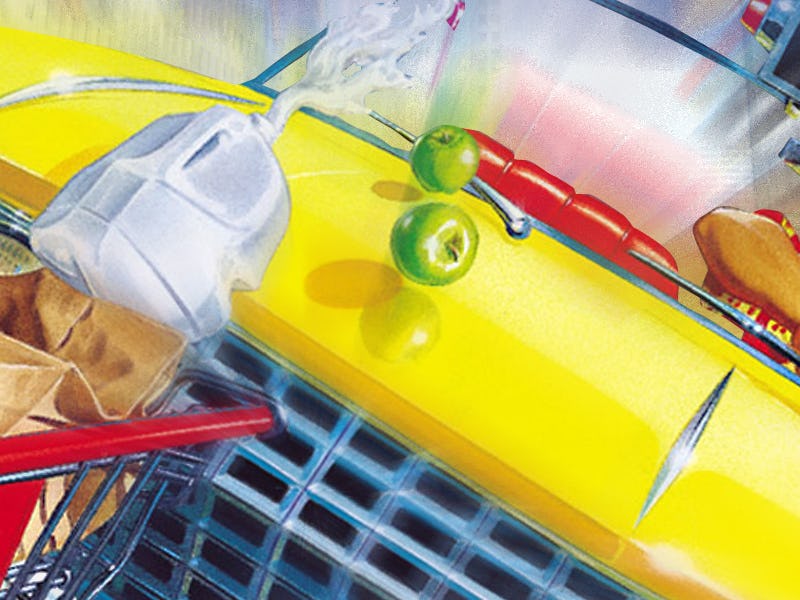RETRO GAME REPLAY | 'Crazy Taxi' (1999)
When the powers that be just breathe down your neck.

“YA YA YA YA YA!”
Any gamer that owned a Dreamcast or hit up arcades in the late ‘90s/early ‘00s will recognize what that comes from. Guaranteed. Just try it sometime.
In 1999, game studio Hitmaker released Crazy Taxi to arcades, movie theaters, and bowling alleys everywhere. And the world went, ahem, crazy for it.
Pure energy squished into a two-minute burst was the banal, mundane task of taxi driving morphed into a roller coaster without the safety harnesses. You take one customer requesting transport from point A to point B in the quickest, slickest way possible, as a punk rock soundtrack ripped from ‘90s teen movies blares from the speakers.
Your customers demand swiftness, and you must deliver them to their destinations in ways that would cause whiplash and lawsuits IRL.
Although a hit on home consoles like the Dreamcast and later PlayStation 2 and Xbox, the game was built upon the ethos of the arcades: Do this, whatever this is, as much as you can in a short amount of time. Producer Kenji Kanno upped the stakes in rewarding players skilled enough with more time, which ironically allowed the game to thrive in the home console realm.
[M]ost of arcade games are designed to have a great wave of emotion within a short span. They get this by grabbing your attention at first glance.
On the other hand, console games are intended gradually build the level of emotional intensity. This is one of the reasons why RPG and adventure games are popular at home.
We started the project with the concept that we’d give players more time to play as they improved their skill in the game. So, in a sense, we already had a taste close to home games.
Players could choose from four distinct drivers with inconsequential stats; all that mattered was who spoke to you the most. A surfer bro with slick hair? A groovy black guy? A hot rocker chick? Just pick, who gives a shit.
Underlying the rush was a looming, capitalist-focused consumerism. Besides the game’s goals of making the most money in the shortest time, the destinations you drove thrill-seeking pedestrians to were often branded. Besides the parks, stations, and churches that indicated the citizens of this pseudo San Francisco live a real life even when you turn off the game, you had to make stops at Pizza Hut, Gap, Tower Records, FILA, or KFC. Yes, Tower Records and FILA. This was definitely 1999, as if The Offspring or Bad Religion-filled soundtrack didn’t give that away.
Over ten years later, ports to the Xbox 360, iOS, and Android devices would strip away these unique signatures of Crazy Taxi. You couldn’t drive to a Pizza Hut anymore, just a pizza place. In a game that celebrated capitalism, it turned its back when it wished for another ride.
In 2009, filmmaker Andy Fickman was promoting Race to Witch Mountain, a forgotten sci-fi fantasy movie starring Dwayne Johnson as a cab driver, when he talked about that relationship between driver and customer.
[I] spent a week there [in Las Vegas] just researching with these cab drivers, there was something fascinating to me and something very human about the fact that there is a unique relationship. That became a fascinating jumping off point as a filmmaker, who gets in your cab? And the stories they tell about people that got in their cab, you’d think aliens landed every day. When Dwayne’s driving and two aliens appear in his cab, he’s stuck with them, there is an implied contract that I will get you to your destination, because that’s what he does.
Was he overselling it? Was he trying to make his Disney movie sound better than it was? To answer both: yeah, probably. Still, one cannot deny that what Fickman said applies to Crazy Taxi, a whole ten years before his movie. I will get you there, by any means necessary. Maybe Crazy Taxi isn’t crazy after all. Maybe it’s pure, pure in total excess.
Or nah. It was a video game. For all the danger a “crazy taxi” could pose, it sought safety in nonsense. Nothing was dangerous because thrill was the intent. Don’t worry about other cars or pedestrians; no one gets hurt. The sky is eternally blue in this polygonal, blocky city. Just enjoy the ride.